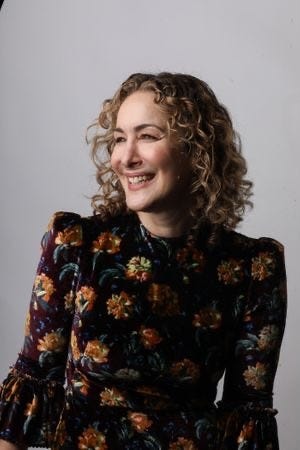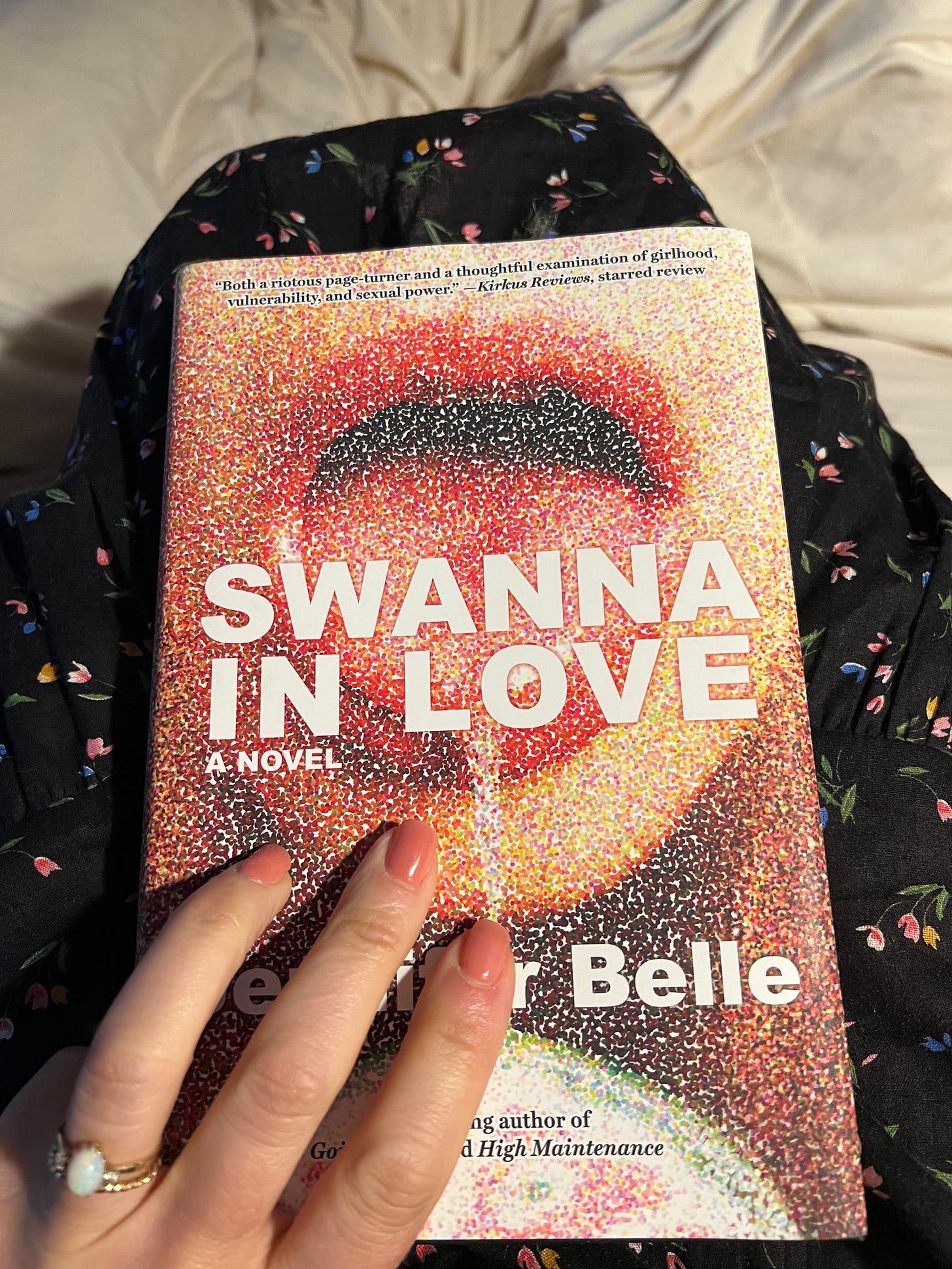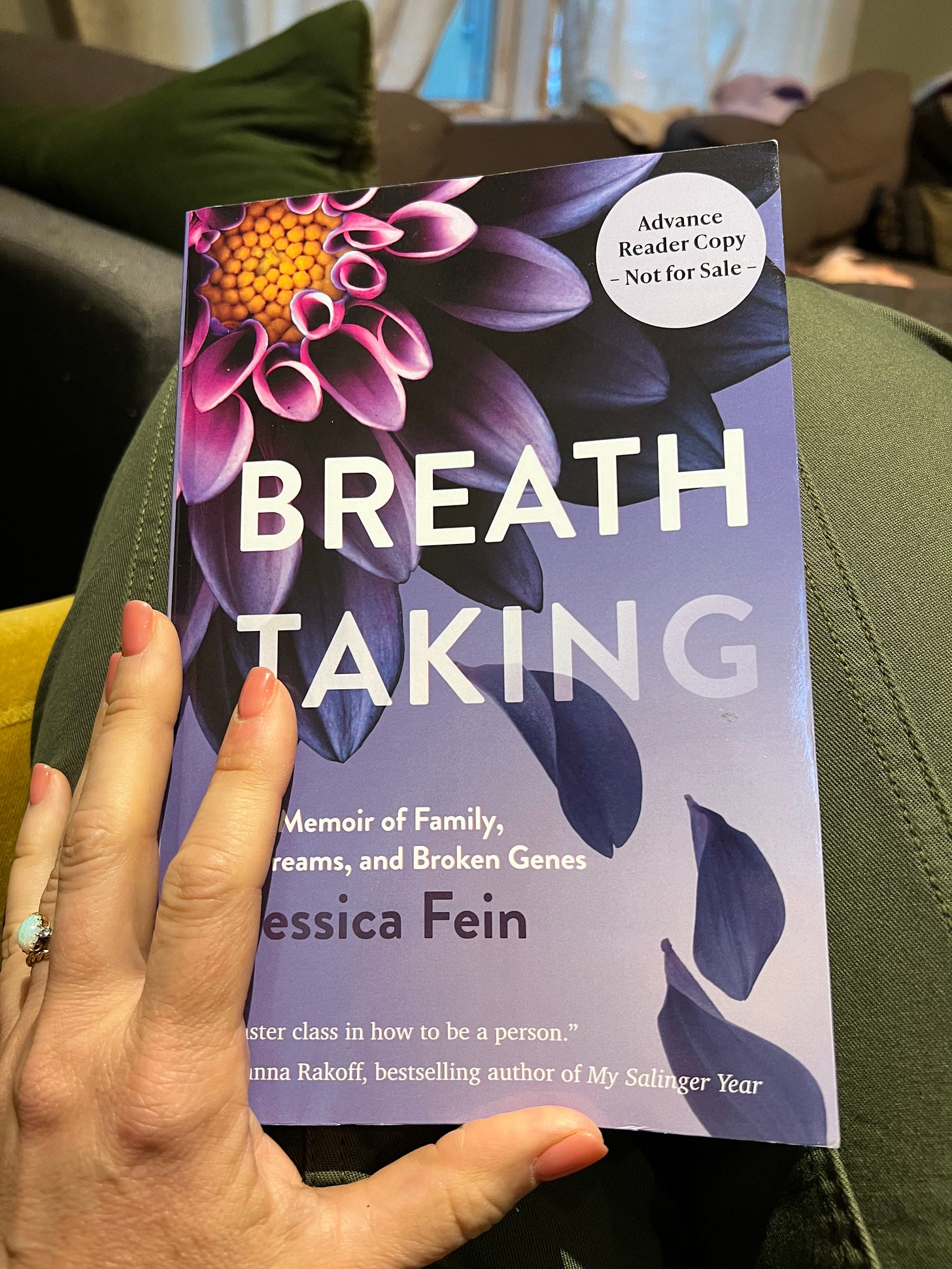A Life in Books (and other wonderful things) with Joanna Rakoff
Ruminations and Books on Mother's Day. And more!
Hello Dear Beyonders!
Have I got a treat for you! The wildly talented, wise, kind, funny, and generous Joanna Rakoff is launching a monthly reading (plus other goodies!) recommendations column here with Beyond. We are so lucky! Prepare to have your TBR book stack explode!
Joanna is one of my most favorite writers! Her memoir My Salinger Year, about working as an assistant to J.D. Salinger’s agent, became an international bestseller, has been translated into fifteen languages, was made into a Showtime movie starring Margaret Qualley and Sigourney Weaver — and went deep-deep into my heart. Her achingly tender portrayal of New York City, her gorgeous prose, and her ability to be both compassionate and unsparingly truthful bowled me over.
The same is true of Joanna’s gripping A Fortunate Age, also set in New York, which follows a group of recent Oberlin graduates as they attempt to establish themselves and thrive in 1990s Brooklyn.
Joanna’s gift with writing carries over into her knack for tracking down the best books out there, reading them, and then sharing why we should read them, too! Over the years, I’ve lined my bookshelves with Joanna’s recommendations. I have a feeling you will, as well!
Born in the Hudson River Valley, Joanna spent much of her life in New York City. She holds degrees from Oberlin and University College London. A mother of three, married to the love of her life, she currently lives in Cambridge, Massachusetts. If you’d like to learn more about Joanna, I’ve dropped the paywall on the interview we did in Beyond’s first year!
As always, I’m so curious to hear what you think! Let me know in the comments!
As an original reader of Beyond–and a longtime admirer of Jane--I’m incredibly excited to become a part of both the newsletter and the community that’s developed around it. Jane’s deep, complicated interviews always make me see the world a little bit differently and with these monthly reading reports, I’ll be recommending books and essays that had the same affect on me. Not just works I loved–for there are many, across genres and eras–but works that shifted my perception of our culture and society, of my daily life, of my own self.
So many books come out each week, each month, each year that avid readers can exist in a miasma of overwhelm. Each month, I’ll be recommending some new releases–to help abate that overwhelm–as well as books from recent years, which I still think of as new, and favorites from previous eras, which I’ve recently re-read.
I’m frantically writing my own new book, The Fifth Passenger, which investigates a dark family secret–involving the death of my siblings–and my reading, these days, is often guided by my work on the book, sometimes intentionally (memoirs delving into family history), sometimes not. So you may notice certain themes or ideas cropping up. But I promise to be aware of this and avoid repetition!
Please do let me know what you think, if there’s anything you’d like me to cover, and, of course, what you’re reading!
Xoxo,
Joanna
In these weeks leading up to Mother’s Day—a holiday I loved as a daughter, but loathe as a mother--I didn’t consciously set out to read books that explore things maternal. But clearly the deep recesses of my mind led me down a highly specific path. Which I suppose isn’t surprising as this has been a year, for me, in which my roles as mother and daughter have eclipsed all other components of my life, more so than at any other moment, even those blurry, animalistic weeks of my children’s infancy, when I could barely tell night from day. Back in September, my mother suddenly began having trouble breathing; a few days later, I sat at her hospice bedside, holding her hand as she took her final breaths. She was 93 and had been in decline for a few years, so none of this was unexpected or tragic, and yet I found myself completely undone, still find myself completely undone, perpetually thinking through both every moment of our lives together and her life before me. Not long after, my oldest child found himself, inadvertently, in a war zone; my middle child wound up in the hospital with a routine case of strep gone horribly awry; and my sweet, joyful youngest child began bursting into tears at unusual moments, sobbing, “I’m so ashamed, I’m a bad person” due, it seems, to new discipline policies at her school. In my normal life, I spend most, or much, of my day sitting at my desk writing; this year, I spent most, or all, of my days sitting by the beds of ill or distraught kids, planning a funeral, or lying catatonic on my couch, exhausted from a night spent sifting through my own distress, my own questions about what it means to be a mother as one’s kids grow older and their needs more complex, and what it means to be a daughter when one no longer has a mother.
Which leads me to the books I’ve read and loved this month, some brand new, some new-ish, some from the vault, all of which destroyed me, in the best way. (Next month, I promise, I have some lighter reads in store.)
WITH TEETH, Kristin Arnett
My husband’s family live in central Florida, near Tampa, a region as foreign to me as say, rural Sweden, and as I planned out our annual summer visit—always an occasion of bafflement and wonder—I decided to read the collected works of Kristen Arnett, a writer whose excellent essays (and general vibe) I’d long admired. WITH TEETH, her most recent—and much-loved—novel, from 2021, shook me to the bone, in a way I didn’t anticipate, for the blurbs and press characterize it as a fun, absurdist romp through Wacky Florida. Emma Straub: “Pure fun.” In fact, I picked it up thinking it would prove a diversion from the relentless awfulness of both the world right now and my own personal travails.
NO.
Friends, this brilliant—even virtuosic—novel is many, many things but it is not PURE FUN. Deeply inhabited, precisely written, filled with complicated, perfectly rendered characters and long, spiraling scenes, elegantly plotted, WITH TEETH is an astonishingly unvarnished, transcendently dark look at a marriage that unravels in the face of motherhood, in this case dual motherhood, as the couple in question is queer. To me, it read as a modern gloss on Richard Yates’ devastating REVOLUTIONARY ROAD, one of my favorite novels of all time. But it’s also, purely, an exploration of the ways motherhood can erode the self.
Set in Orlando in the recent past, the novel follows Sammie as her silent, spooky son Samson grows from a defiant preschooler into a destructive fourth grader and angry, crass high schooler. Is Samson autistic? Sociopathic? Suffering from some sort of unknown, nebulous trauma? Or is Sammie simply ill-equipped for motherhood? Or for raising a boy rather than a girl? Or for the isolation and dullness of stay-at-home motherhood? For with Samson’s birth, her marriage has placed her firmly in the role of housewife, relegated to endless loads of urine-soaked laundry and school conferences and chicken-finger-preparation, while her wife, Monika, spends long days at her law office and travels constantly, leaving Sammie irretrievably, heartbreakingly alone. I’m not giving anything away by telling you that their marriage devolves—despite their enduring love and attraction for each other, beautifully rendered in Arnett’s nuanced prose—or that this is decidedly not a novel of redemption and revelation and happy endings. It is not “pure fun.” It is something far, far better: soul-wrenching and unforgettable and timeless.
SWANNA IN LOVE, Jennifer Belle
In 1996, when I was an assistant at a literary agency, I basically wanted to be Jennifer Belle, whose first novel, GOING DOWN—about a college student who takes a job as an escort--came out that year to tremendous praise and, in my Brooklyn-ish circles, cultish excitement. For it captured, in a way few other works did, our own experience as young people in post-Eighties-recession-era New York. Or maybe—looking back on it with nearly thirty years (HOW AM I THIS OLD?) perspective—Belle captured a certain tone that rang gloriously, refreshingly true, at once jaded and naïve, realistic and starry-eyed, just as the New York she portrayed was glamorous and gritty, delightful and depressing.
Belle’s new novel, SWANNA IN LOVE, reads almost as a prequel to her ebullient debut. Over the years her style—with shades of Nora Ephron and Laurie Colwin—has evolved into something more expansive and lush, with moments of lyricism, while maintaining her sly, subtle humor and that singular tone I loved so much as a 23-year-old. The novel begins with the titular Swanna, a fourteen-year-old Upper West Side kid, waiting for mom—a famously beautiful poet--to pick her up from theater camp. Her mom arrives four hours late, straight from a stint at Bread Loaf, with her new, much younger boyfriend in tow. Instead of going home—where Swanna’s professor father has moved out of their classic six and into a downtown apartment with his much younger girlfriend—she drags Swanna and her sweet younger brother to a different artists’ residency, in rural Vermont, and largely leaves the kids to their own devices: They sleep in the back of a pickup truck, eat scraps leftover from the artists’ breakfast, and, in Swanna’s case, engage in an affair with a local doctor more than twice her age.
Did I mention the novel is set in 1982?
Narrated in Swanna’s swaggering, sophisticated voice, the novel definitely brings to mind Catcher in the Rye, and when I read it, last spring, in manuscript, I thought it would take the world by storm Catcher-style. Though it’s garnered incredible praise, it hasn’t, and as I re-read it last month, I wondered if this had everything to do with the uncomfortable questions it raises about sexuality and consent—I mean, it involves a fourteen-year-old girl enthusiastically having sex with a grown man—and maybe, just as much, the pitch-perfect portrayal of motherhood in that era, which could kindly be described as benign neglect. (One friend texted me to say she found it harrowing as Swanna’s mother reminded her of her own.) Regardless, Jennifer Belle is one of the most underrated, underread writers of our day, and this novel is a tour de force.
MOMFLUENCED: Inside the Maddening, Picture-Perfect World of Mommy Influencer Culture, Sara Petersen
Okay, like everyone else in the world, I spend too much time on Instagram, but until I began reading Sara Petersen’s excellent think pieces on mother-influencers, I didn’t know this was a thing. (I had never even heard of Ballerina Farm! How?!) Petersen’s funny, smart, compulsively readable book frames the subject with her own experience of motherhood, and synthesizes her years of commentary—and deep thinking—on the subject with new research, and the result far exceeds the sum of its parts.
I don’t read a ton of nonfiction, but I could not put this one down, largely because of Petersen’s warm, smart, wry narration. She has an awe-inducing ability to bore down into the heart of allegedly-trivial matters, opening one’s eyes to the invisible cultural forces guiding our lives. In other words: The intense pressure I feel to be perfect, as I tend to my eight-year-old—which I didn’t quite feel in the my pre-Instagram youth of my teens—comes directly from the momfluencers selling me hair extensions and bespoke baby shoes, even if I’ve never even glanced at their feeds. And the same goes for every phase of life, every corner of society, even yours, friend. A must-read for anyone looking to comprehend the absurd and dysfunctional cultural moment in which we live.
BREATH TAKING, Jessica Fein
I tend to avoid books, fiction or non, in which children die or are in some sort of mortal peril. (My next book is basically about the reason for this.) But after hearing Jessica Fein interviewed on Every Soul Has a Story–novelist Dara Levan’s wonderful podcast–I sort of fell in love with her, as a person, and wanted to know more about her life, in general, and experience caring for her daughter, Dalia, after her diagnosis with a rare, and fatal, genetic disease. In that interview, Fein speaks with such grace and warmth and understanding–of herself, of the world, of everything–and her new memoir, BREATH TAKING, is no different. Though I held my breath and sobbed throughout, the memoir is more a tale of love than death, largely because of Fein’s intimate, conversational style. I read it all in one day, as I sat by my mother’s hospice bedside, book in one hand, hers in my other, and rather than exacerbating my feelings of grief and loss, it softened them.
Some shorter reading:
For the past four years, Sarah Wildman has been writing a series of essays for the New York Times about her older daughter Orli’s struggle with liver cancer and death. To say these are some of the most beautiful and profound pieces I’ve read, ever, would be an understatement. Here’s the latest, and the first, if you want to start at the beginning.
My dear friend and cystic fibrosis advocate Melissa sent me this long, investigative piece in the Washington Post about children who show signs of remembering past lives—yes, you read that right—in a state of shock, as it explained some odd behaviors from her daughter’s toddlerhood. A jaw-dropping read.
This thoughtful, ferocious, Harper’s Bazaar essay--on what it means to be an Iranian woman in this day and age—is a good gateway into the warm, singular writing of filmmaker Naz Riahi, whose short story collection is one of my most-anticipated books of 2025. I love her essays for Oldster, in particular. Here’s a link to all her work, if you like this one.
Reading now: Catherine Grey’s riveting debut novel VERSIONS OF A GIRL, which envisions two alternate paths for her heroine, one if she stayed with her mother in London, the other if she went with her dad to California. Coming out July 4, 2024 in the UK only, unfortunately, but Waterstones ships all over the world! And Maggie Smith’s KEEP MOVING, which I’ve somehow never read, despite loving both her poetry and prose.
Up next: GHOST MOTHER, the much anticipated (by me!) new novel from Kelly Dwyer, whose debut, TRACKS OF ANGELS, had a huge impact on me in college. And LAST HOUSE, the latest novel from Jessica Shattuck, who’s mostly known for her historical novel THE WOMEN IN THE CASTLE, but I’m a fan of her delightful comedy of manners, PERFECT LIFE.
*
Other things I love right now:
Superstore–My fifteen-year-old daughter, Pearl, has the best taste in everything and she insisted I watch this warm, smart series, starring America Ferrerra as the floor manager of a Target-like big box store, which ran from 2015-2020. Despite the powerful social critique at its heart, it’s proven a balm for the terrifying times in which we live.
Chappell Roan–I recently spent two weeks at Yaddo, working on some really brutal sections of my new book and reading hundreds of family letters as research, and whenever I felt like I couldn’t move on, I blasted Red Wine Supernova or Hot to Go, sang along at the top of my lungs, and danced crazily around my studio.
Passover candy–Look, I love Peeps as much as the next person and Easter candy is awesome, but there’s truly nothing better than a Joyva marshmallow twist.
Thank you for being here, dear Beyonders! ❤️ Your comments (and hearts) mean so much to me. I read each and every one.















So excited for this what an excellent feature. Heart palpitating slightly at the thought of a host of new authors to discover recommended by someone so clearly credible 💜
I like this feature and the way you write about the books. You give a concise sense of the sensibility that the book conveys, enough to help us figure out which ones are for us. And it's useful to use other books that most of us have probably read to help us locate the book on a literary map.
Revolutionary Road is a favorite of mine. I've always related it primarily to a false sense of exceptionalism rather than the pressures of motherhood, but of course that enters into it.